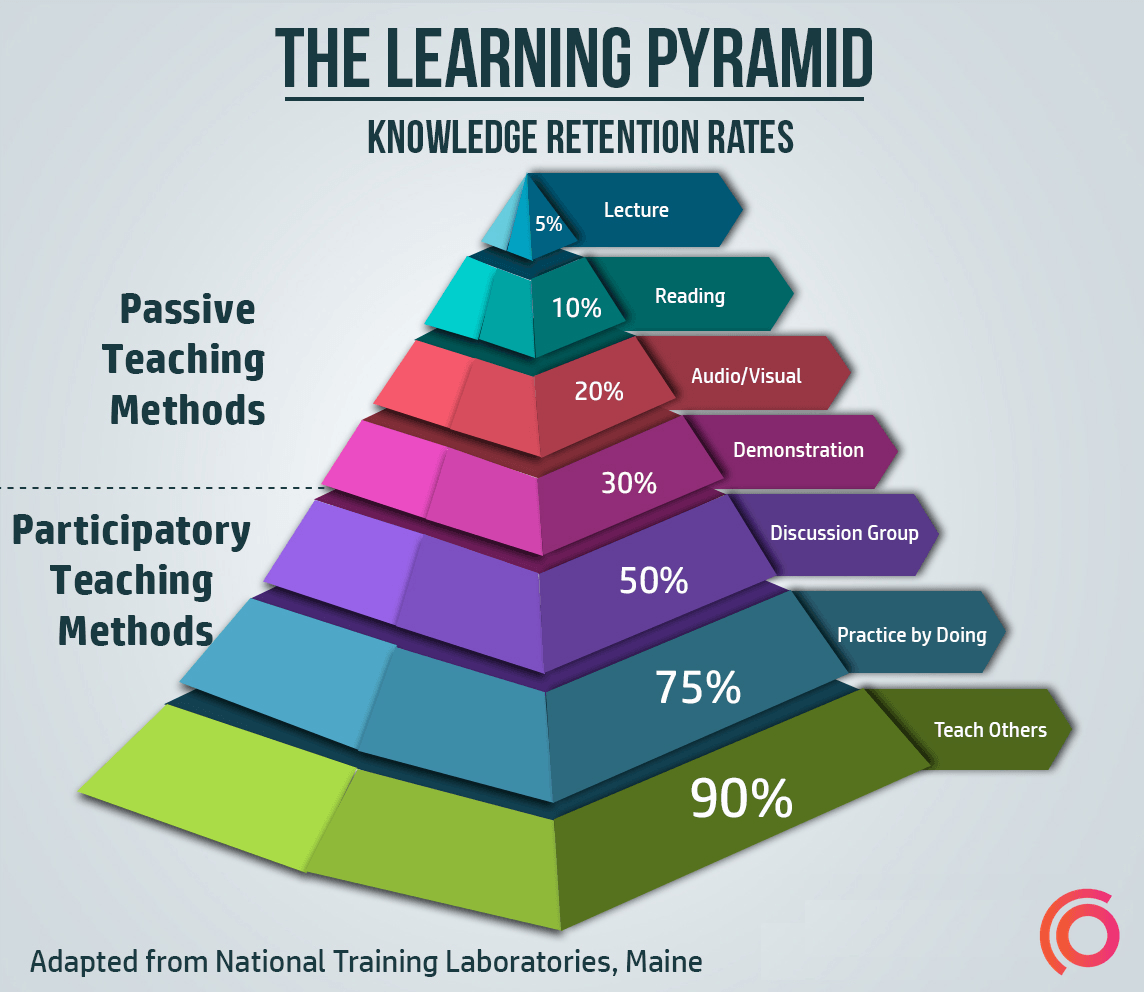You’ve come to the right place. In this article, we’ll share with you the 5 best ways to learn any language, where you can go to start learning, and the pros and cons for each option. Before we dig in, let’s first understand how we best learn, beyond just languages.
How humans best learn
Given the decades of research and studies done on the human brain, learning institutions have publicly shared the results of how humans best learn. A notable study published is the development of the Learning Pyramid in the 1960’s – widely attributed to the NTL Institute in Bethel, Maine – which outlined how humans best retain information. It turns out that humans remember: 5% of what they learn when they’ve learned from a lecture (i.e. university/college lectures) 10% of what they learn when they’ve learned from reading (i.e. books, articles) 20% of what they learn from audio-visual (i.e. apps, videos) 30% of what they learn when they see a demonstration 50% of what they learn when engaged in a group discussion 75% of what they learn when they practice what they learned 90% of what they learn when they use immediately (or teach others)
Anyone who endured through the boring lectures in university or college can probably relate to how ineffective learning is when done through lectures or traditional textbooks. It’s one information in one ear, and out the other!
While you can learn mathematics or history without any interaction, that’s not how language learning works. In other words, languages were meant to be learned and used with other humans, not through an algorithm based app like Duolingo, Rosetta Stone, or Youtube. It’s a good way to learn as a hobby, but if you’re seeking real results, the decades of scientific research shows that this is the wrong approach. The good news is that there are better ways to learn a language than relying on the traditional, ineffective methods that our brains were not trained to learn with. Compared to learning through lectures, you’ll notice that learning through immersion (i.e. speaking with native speakers/humans) is up to 18 times more effective. This leads us to reveal the 3 best ways to learn a language (through immersion!)
1. Accountability Partner
Where to start: Your inner circle and network. Pros: Free Cons: Very difficult to find someone that can help you, unless you’re offering something in return. Sustaining the relationship is also complicated over a longer period of time. A good place to start learning anything is within your own circle of friends. If you can think of someone that already knows how to speak Spanish, Italian, or your target language, ask them to help you out. The worst thing that can happen is, they will tell you they’re too busy or they may know another friend that can help out. In terms of difficulty finding someone, this ranks the highest because most of us lack the network to find a credible person to help us out, or we just don’t feel comfortable asking our friends without giving anything back in return.
2. Conversation Exchange
Where to start: MyLanguageExchange.com Pros: Free and lots of fellow language lovers you can meet online Cons: Time consuming and requires patience to find the right language partner that matches your schedule. Most language partners you will find will also not have any professional experience teaching. The second option to learn a language through immersion is a conversation exchange. A conversation exchange is where people that are looking to learn a language come together, in order to help each other practice their target languages. In a perfect situation, you can find someone who’s a fluent speaker in your target language and also wants to learn the language you speak fluently. This way, there’s a mutually beneficial relationship that’s formed. From personal experience, most conversation exchanges can suck up a ton of time just trying to find a language partner that fits your target language, schedule, and personality. If you’re missing even one of those factors, the conversation exchange will most likely not last.
With that said, if you do have a lot of time on your hands and you’re incredibly motivated to learn a new language, going with the conversation exchange route may be the best option for you. For the rest of us, who don’t have a lot of time, or want to work with a native speaker who’s a professional, you should go with…
3. Professional Language Lessons
Where to start: Rype, Craigslist Pros: You get to work with a professional teacher, who’s 100% dedicated to your needs and success. Unlike a conversation exchange, you can usually choose the time you want to learn on your schedule, which saves you a lot of time. Cons: Like any professional service, language lessons is an investment. What if you want to learn a language, but you don’t want to bother your friends, and you have a busy lifestyle? Language lessons online is the answer for you. Instead of going to a language school and learning with 15-20 other students, or commuting an hour to meet an in-person language teacher, you can learn at the comforts of your own home, or wherever you are around the world.
If you go with a service like Rype, you can also get unlimited private lessons (yep, that’s one-on-one) with professional teachers who are available 24/7. In summary, here are the main benefits of language lessons online (and why it’s our favorite option):
Save more time (no commuting, and no preparation required) Connect with native speaking professionals who actually live in countries that speak your target language (real-life immersion learning brought to your screen) Get accountability and full access to ask questions & feedback when you want (not something you get with conversation exchanges)
What’s next?
Share the first step you’ll take today to learn a language. Which of these best ways to learn a language resonated most with your lifestyle? Let us know!



